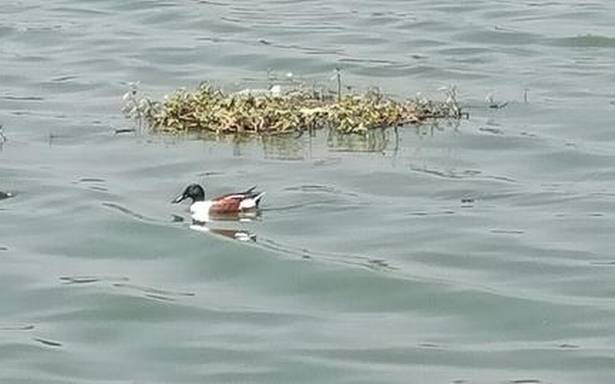The Chinna Eri in Thuraiyur has attracted Northern Shoveler, a duck species, much to the surprise of bird watchers since the pollution level has been on the rise.
A pair of these birds, believed to have migrated from as far as northern Europe, was spotted by Q. Ashoka Chakkaravarthy, wildlife biologist. Passage migration – stopping for a short duration during the course of seasonal migration – could be the reason. It was possible that the heavy spells of rain had brought down the pollution level of the waterbody. Yet another possibility was that unseasonal cyclones had altered the migration route, Mr .Chakkaravarthy said.
Northern Shoveler, with its large spoon-shaped bill, busily forages head down in shallow wetlands. Its unique-shaped bill has comb-like projections along its edges, which filters out tiny crustaceans and seeds from the water. Northern Shovelers are monogamous and remain together longer than pairs of most other dabbling ducks.
The special character of a female Northern Shoveler is that it often defecates on its eggs, apparently to deter predators. Female Northern Shovelers have mottled brown, black and white feathers and a blue patch on their wings. It can fly more than 10,000 km. Northern Shoveler displays Sexual dimorphism (the differences in appearance between males and females of the same species). Northern shoveler is common in other wetlands but has been spotted for the first time in Chinna Eri, he said.
The Chinna Eri wetland ecosystem has been a temporary home for avian visitors from far off places for long. But, of late, the high level of pollution has caused a dampening effect.
The presence of the bird species depends on many factors like size of the wetland, food availability, threat level, level of pollution. Desiltation of the waterbody will be helpful in attracting migratory birds in large numbers, Mr.Chakkaravarthy said.
Located in front of the Thuraiyur bus stand, the Chinna Eri, which was once a source of potable water, now is a dump for plastic and other polluting wastes. Plastic waste from shops, hospitals and restaurants are being dumped into the waterbody, causing a hazard to the ecosystem.
The waterbody has become a breeding ground for mosquitoes due to the loss of predator organisms such as insects and birds. Diversion of contaminated household waste water, human faecal matter, and garbage have made matters worse, adversely impacting the habitat and camping of migratory birds. The municipality has a major role in protecting the habitat for migratory birds, Mr. Chakkaravarthy said.
Source: Read Full Article

